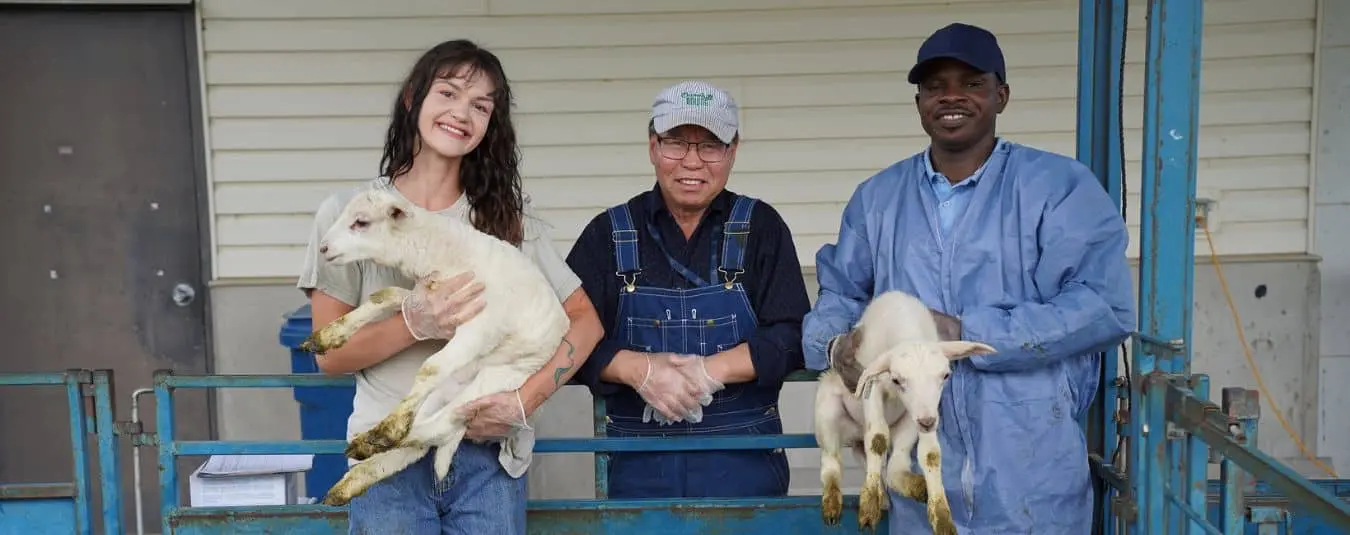
Agriculture with Animal Science
Overview
The BSc (Hons) Agriculture with Animal Science degree combines agricultural science with specialised knowledge in animal welfare, health, and management. This programme provides students with the skills to sustainably manage livestock while applying modern agricultural practices for global food security.
The course also covered nutrition, reproductive physiology, health, breeding, and emerging biotechnologies in animal science. The programme offers students a wide range of skills that can be easily applied in various graduate or professional settings.
Objectives
- Develop a foundation in agricultural sciences and practices.
- Develop problem-solving and critical thinking skills.
- Foster innovation and entrepreneurship in agriculture.
- Prepare students for successful careers in agriculture.
- Equip students with animal welfare, nutrition, and breeding skills.
- Promote understanding of sustainable agriculture and food production.
- Prepare students for leadership roles in animal science and agricultural sectors.
Prerequisites
- Two A-levels or equivalent.
- Preferably in biology or related sciences.
- Strong communication and interpersonal skills.
- English language proficiency is required.
- Desire for positive impact.
- Solid interest in agriculture and animal welfare.
- Work or volunteer experience in farming or animal care is beneficial.
Curriculum Outline
- Exploration of agricultural technologies.
- Examination of farm animal production systems.
- Study of agricultural grassland and cereal crops.
- Study of cropping strategies.
- Investigation of land use factors.
- Gaining business management skills.
- Preparation of farm budgets and commodity market analysis.
- Examining factors influencing animal health and welfare.
- Focusing on resource efficiency and financial performance.
- Studying animal nutrition, anatomy, and physiology.
- Exploring research's role in developing efficient animal production systems.
- Considering agriculture from multidisciplinary and interdisciplinary perspectives.
- Understanding relationship between policy, socio-economic factors, agricultural practices, and rural economy.
- Compulsory research project under supervisor's guidance.
- Projects may involve laboratory experiments, fieldwork, computer modelling, or data analysis.
Teaching Method
- Lectures
- Tutorials
- Personal tutors
- Practical sessions
- Laboratory work
- Field trips
- Guest speakers
- Hands-on experience with animals
Modules
- Agricultural Technology and Farm Safety
- Business, Economics and Land Use
- Crop, grassland, soil and agricultural land management
- Introduction to Livestock Production and Science
- Skills for the Agricultural Industry
- Animal Breeding: Genetics and Reproduction
- Applied Nutrition of Livestock, Horses and Companion Animals
- Livestock Production and Management
- Research Methods
- Agronomy and Crop Improvement
- Farm Business Management and Appraisal
- Food, Farming, Technology and the Environment
- Immunology
- Veterinary Health
- Advances in Agriculture
- Livestock Production Science
- Critical Review
- Research Project
- Advances in Crop and Grassland Production
- Behaviour and Welfare of Domesticated Animals
- Farm Planning and Advanced Farm Management
- Veterinary Infectious Diseases
- Veterinary Pharmacology and Disease Control
Assessment Methods
- Essays
- Plans
- Worksheets
- Project work
- Field notebooks
- Examinations
- Case studies
- Oral Presentations
- Written assignments
- Practical reports and exercises
Course Duration
This programme may vary depending on the institutions and countries, but the general standard options in the UK are:
- 03 years (Full-time).
Facilities
- Livestock farmer.
- Veterinarian.
- Animal nutrition consultant.
- Agricultural researcher.
- Agribusiness manager.
- Government official.
- NGO worker.
- Animal welfare officer.
- Zookeeper.
- Wildlife conservationist.
- Teacher or lecturer.
- Entrepreneur.
- Dairy farmer.
- Beef cattle farmer.
- Sheep farmer.
- Pig farmer.
- Poultry farmer.
- Research scientist.
- Farm manager.
- Marketing specialist.
- Sales representative.
- Policy analyst.
- Environmental specialist.
- Sustainable agriculture specialist.
- Animal welfare specialist.
- Livestock health Specialist.
- Animal genetics specialist.
- Animal reproduction specialist.
- Animal behaviour specialist.
- Animal welfare auditor.
- Animal welfare educator.
- Animal welfare campaigner.
- Animal welfare advocate.
- Animal rights activist.
Career Pathways
- Livestock farming
- Veterinary medicine
- Animal nutrition consulting
- Agricultural research
- Agribusiness
- Agri-tech Specialist
- Government agencies
- NGOs
- Animal welfare officer
- Zookeeper
- Wildlife conservationist
- Teacher or lecturer
- Entrepreneur
Fees and Fundings
- Tuition fees are £20,715 per year and may vary depending on the institution.
- Scholarships, grants, and financial opportunities are available.
- Government loan aid is available.
Entry Requirements
- GCSE requirements (minimum grade C/4).
- Background in Science and Mathematics (recommended).
- A Levels BBB-CCC.
- BTEC national diploma: DDD-DDM.
- English language requirements.
- Strong communication and interpersonal skills.
Field Work and Internships
- Opportunities for fieldwork in modern farming environments.
- Industry placements and internships with leading agricultural companies.
Certifications
- Certified Crop Advisor (CCA)
- Certified Professional Agronomist (CPA)
- Certified Professional Animal Scientist (CPAS)
- Certified Professional Soil Scientist (CPSS)
- Certified Professional Plant Scientist (CPPS)
- Certified Professional Wildlife Biologist (CPWB)
- Certified Sustainable Agriculture Specialist (CSAS)
- Certified Organic Farmer (COF)
- Certified Precision Agriculture Specialist (CPAS)
- Certified Irrigation Specialist (CIS)
- Certified Pest Management Professional (PMP)
- Certified Dairy Specialist (CDS)
- Certified Beef Specialist (CBS)
- Certified Poultry Specialist (CPS)
- Certified Swine Specialist (CSS)
- Certified Aquaculture Specialist (CAS)
- Certified Livestock Handler (CLH)
- Certified Animal Welfare Specialist (CAWS)
- Certified Livestock Nutritionist (CLN)
- Certified Livestock Reproductive Specialist (CLRS)
- Certified Livestock Health Specialist (CLHS)
Intakes
Typically, it takes twice a year (fall and spring), but may vary like:
- Fall (September/October)
- Spring (January/February)
- Summer (May/June)
Student Testimony
“I love the practical aspect of the Animal Science course as well as the interesting lectures. Being able to choose a pathway means we are able to specialise and study what we are most interested in.” Says “Lewis Wescott, Agriculture with Animal Science.”
Frequently asked questions
The programme focuses on sustainable farming practices, with a special emphasis on animal health, welfare, and nutrition. It integrates both crop and livestock management while also exploring cutting-edge agricultural technologies.